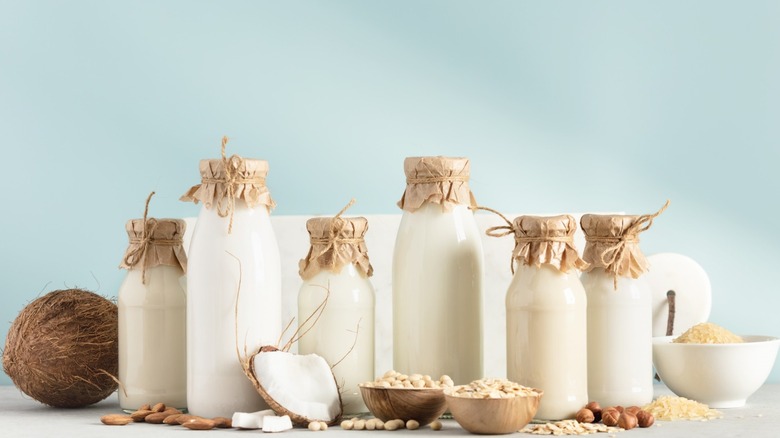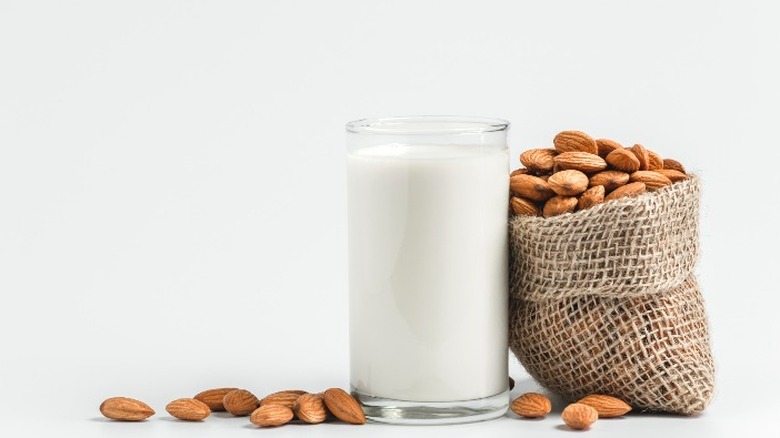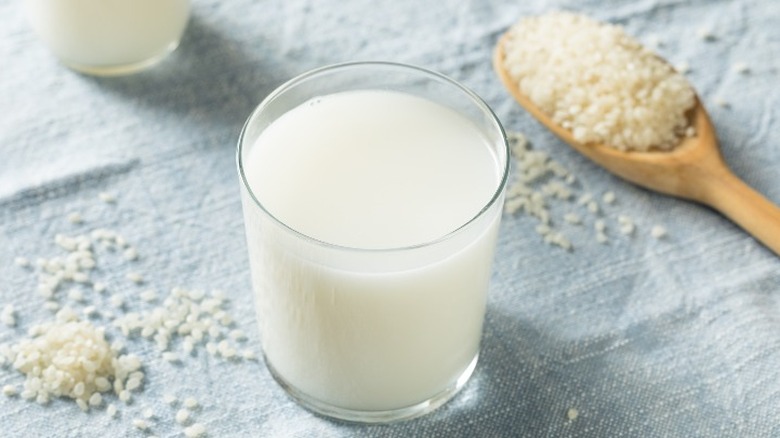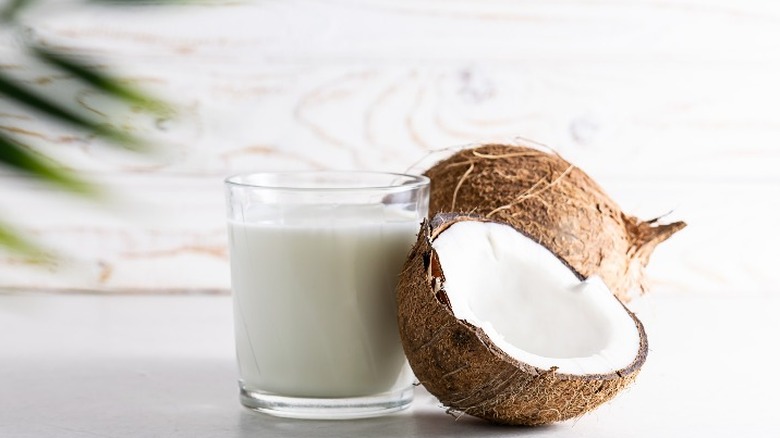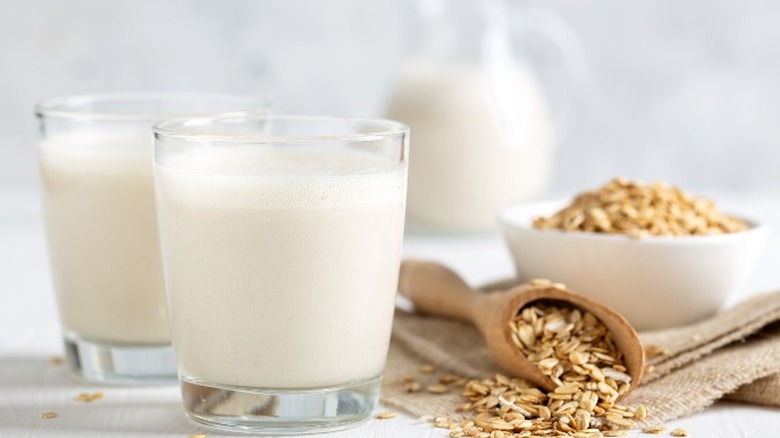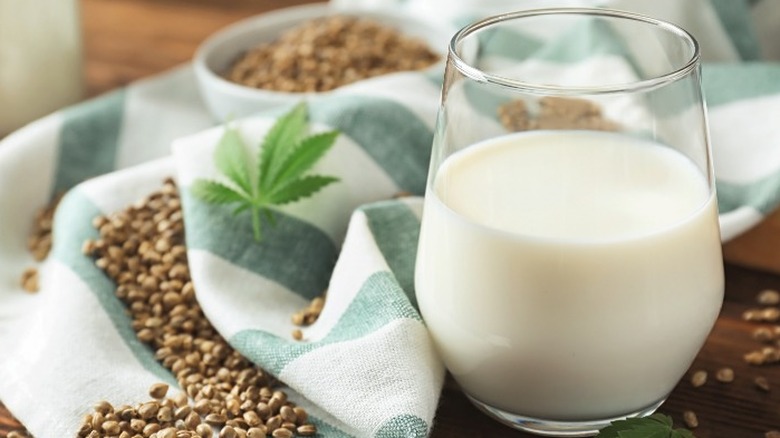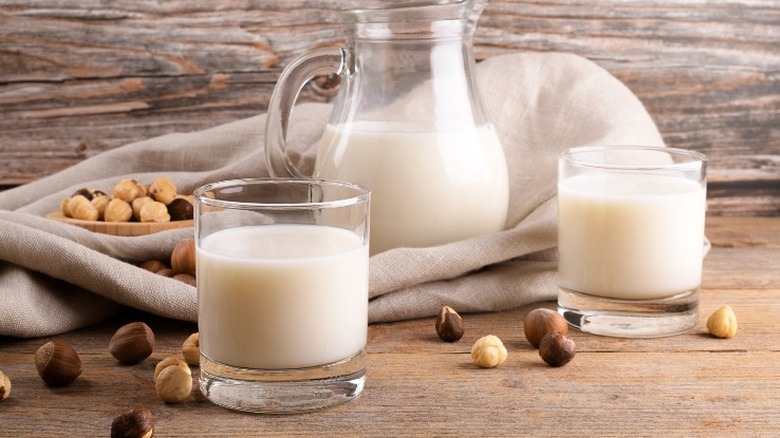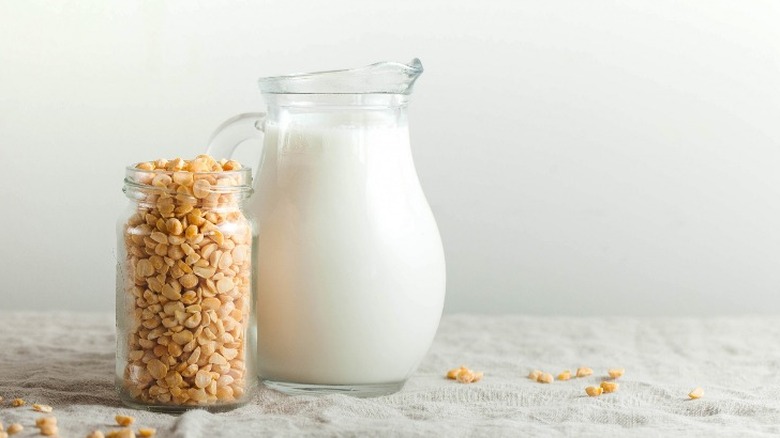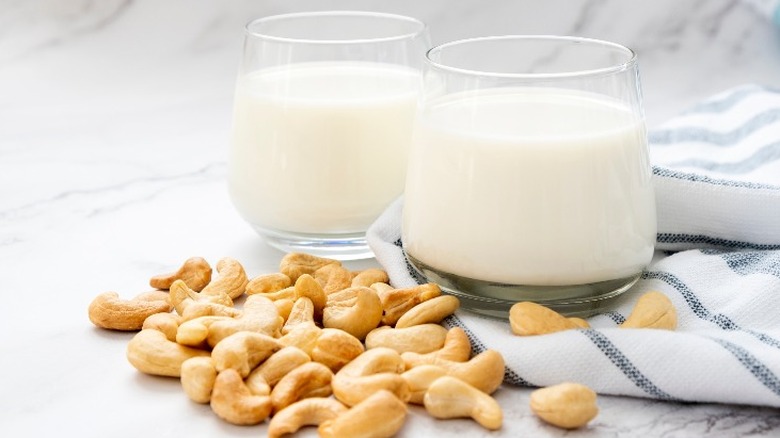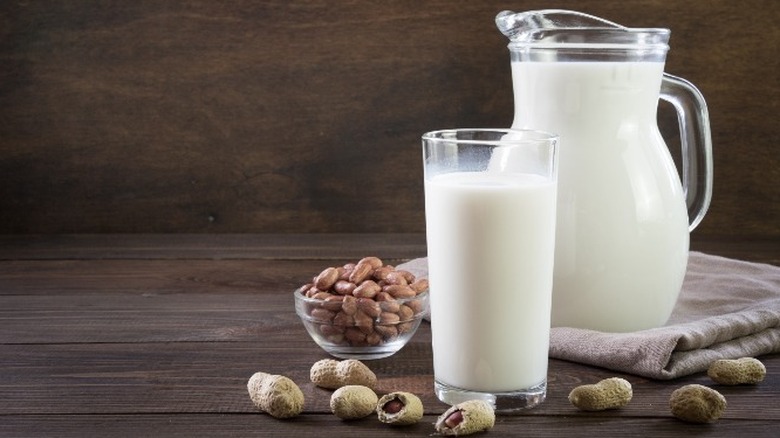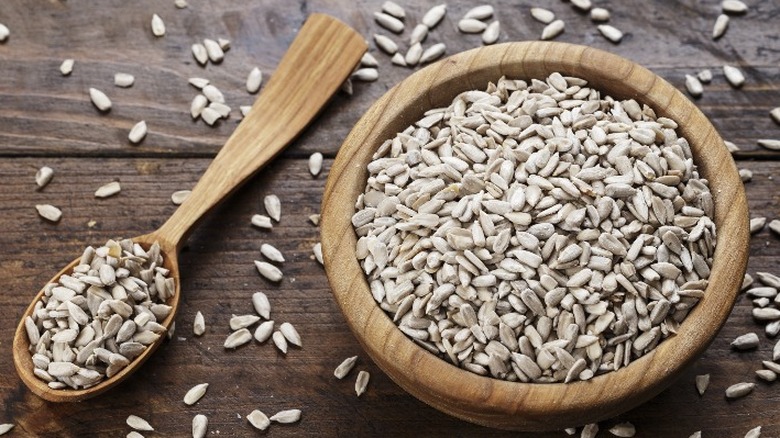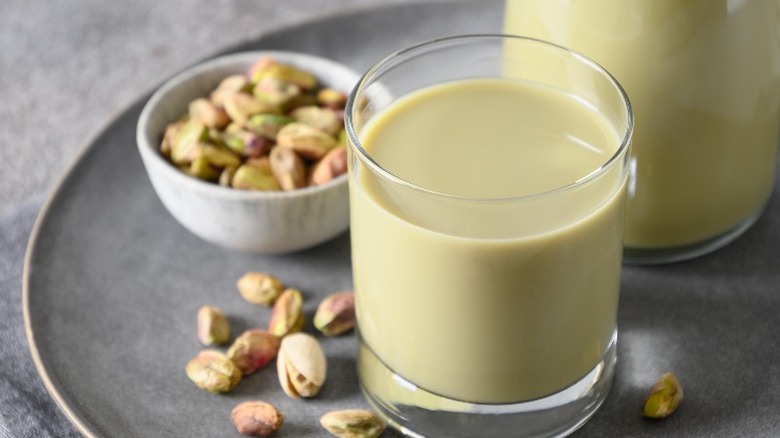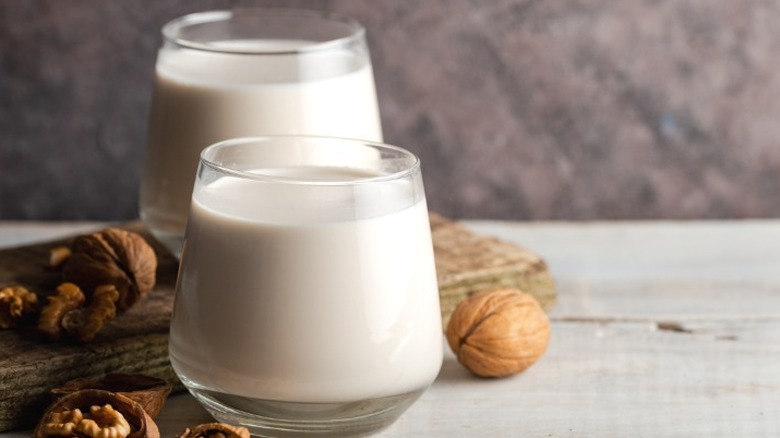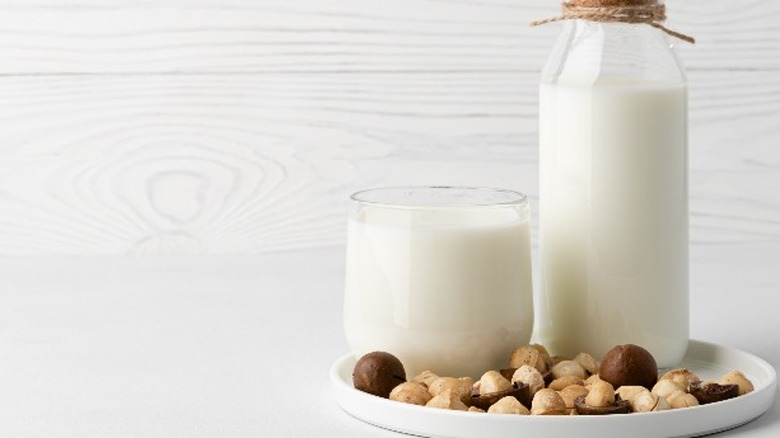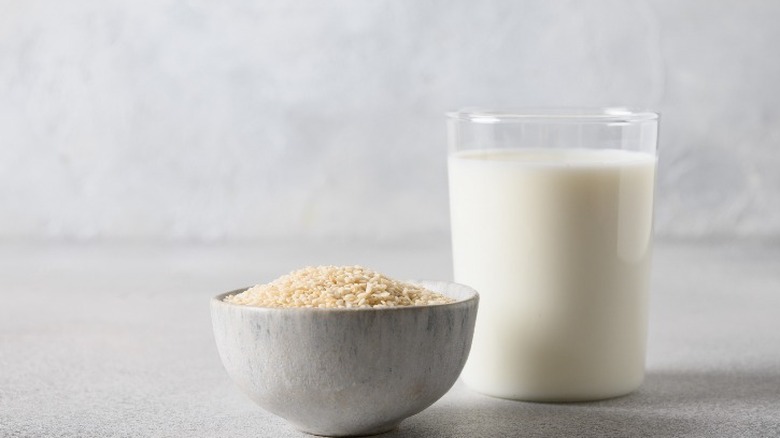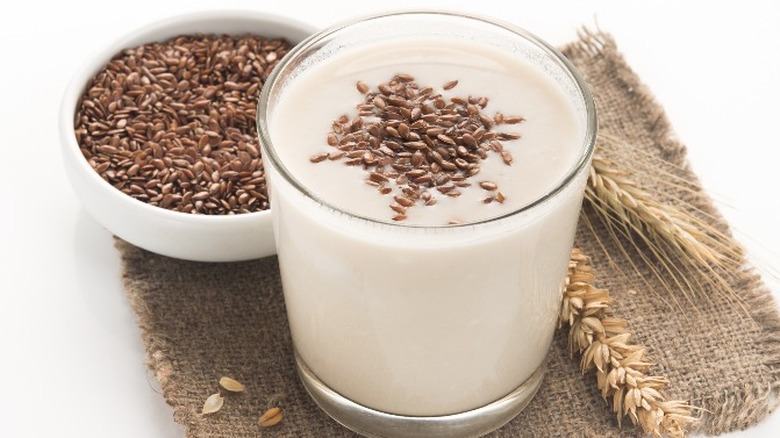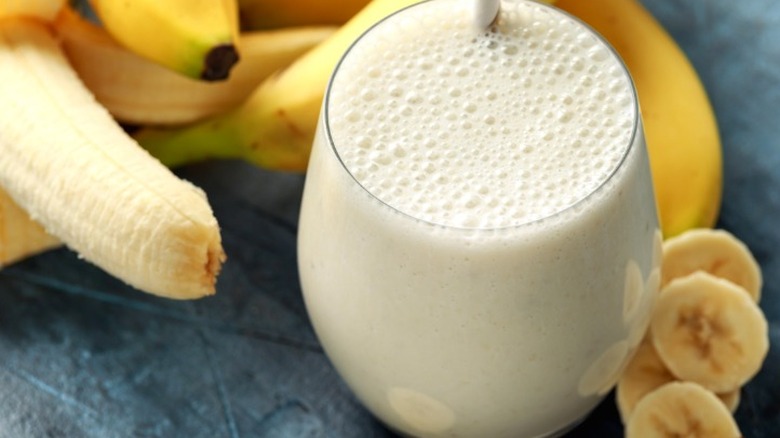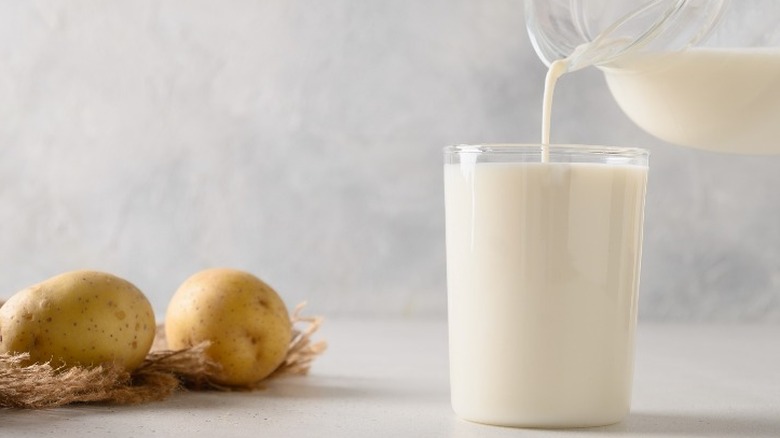19 Types Of Plant Milk, Explained
Over the last decade, dairy milk alternatives have been steadily gaining in popularity and are expected to become even more ubiquitous in the next five years. Why? Not only is plant milk suitable for people with various dietary restrictions and made without dairy or other animal products, but they offer a host of nutritional benefits and a lower carbon footprint.
Move over soy, oats, and almonds: from hemp to pea, rice to coconut, and flax to potato, there is an abundance of plant milk to choose from, each unique in its own way. Whether you're suffering from allergies, looking for a sustainable alternative to cow's milk, or just craving something new, a plant milk option is right for you. And trust us when we say that anything dairy can do, they can do too (and better). If you've come to learn more about various types of plant milk, their associated health benefits, and their culinary uses, then you've come to the right place.
Soy
Long before it became popular as a cow's milk alternative in the western world, soy milk was a staple of Chinese and other Asian cuisines. Traditionally, it's made by soaking soybeans, boiling and grinding them, and then separating the milk from the pulp. Soy milk has a mild yet distinctly beany flavor, which is further subdued in the North American varieties, according to Chatelaine.
Of all plant-based milk, soy is the closest to dairy in terms of protein content and overall performance. By cup, it contains 8 grams of protein and all the essential amino acids you need. It is also excellently stocked with vitamins A and B, potassium, calcium, and omega-3 fatty acids (via WebMD). While soy milk works great in smoothies, baking, and sauces, adding it to coffee requires caution. If you prefer a strong, hot cup of joe, adding a big splash of soy milk might cause it to curdle. To avoid that, try switching to lower-acid beans and pouring the coffee into the milk, rather than the other way around.
Almond
According to some ancient histories, Medieval Europeans couldn't get enough of almond milk's sweet and nutty flavor — some even claim it as one of the most important ingredients of the time. Today, it takes up over 60% of the U.S. plant-based milk market, per Food Dive, making it one of the most enduring nondairy beverages on par with soy milk. What is the secret of its lasting allure?
For starters, almond milk has low fat and calorie content. Additionally, it's a good source of vitamin E and calcium (via Healthline). Its delicate flavor makes it a pleasant addition to drinks, cereals, and baked goods. Finally, while there are many brands of almond milk to choose from, it's also easy to make your own by soaking, blending, and straining the almonds. Unfortunately, it's one of the least sustainable kinds of milk, requiring 130 pints of water to produce a single glass and negatively affecting bee populations (via The Beet). If you're looking for a more eco-friendly alternative, go with one of the other options.
Rice
Rice milk is an inexpensive and widely available dairy alternative revered for its hypoallergenic quality. Compared to other kinds of plant milk, it boasts a high carbohydrate content at 22 grams per cup, which could be beneficial for those on a high-carb diet but problematic for people with diabetes (via Healthline). Unfortunately, it is also not the most sustainable. According to reporting by The Guardian, rice farming requires a lot of water and results in methane production.
Still, it's a viable choice for those with a soy or nut allergy. Making it at home requires just two ingredients: rice and water. The first step would be to cook the rice, blend it with water, and strain it. While it won't contain as many nutrients as the fortified commercial varieties, it's more cost-effective. If you want to take it to the next level, try making a Mexican horchata recipe, a creamy rice-based drink bursting with cinnamon flavor.
Coconut
Coconut milk is a tropical-tasting shelf-stable dairy alternative that comes in two forms: can and carton. The beverage sold in cartons is best used for drinks or over cereal, but as a canned counterpart, coconut milk is commonly used in cooking, especially in Southeast Asian and African cuisines. The creamy texture of canned coconut milk makes suits it for added dimension to soups, sauces, or vegetable curry recipes. It also works well in baking and dessert making.
Whenever you need coconut cream, you can extract it from a can of milk: store it upturned in the fridge overnight, and then scoop the thick white part out. Similarly, you could turn a can of coconut cream into milk by thinning it with water. You can also make it at home by processing coconut flakes with water. Remember that this milk's flavor is more present than others, so if you're not a fan of coconut, go with another option.
Oat
A product of one food scientist's ingenuity, oat milk was invented fairly recently, in 1994. However, it has enjoyed a particularly meteoric rise in popularity since it appeared in New York's coffee scene in 2016. Oat milk has a mildly sweet flavor and unparalleled frothing ability, making it the top choice for coffee-based drinks. The oat milk trend got so big, in fact, that supply constantly failed to meet demand, resulting in shortages across North America. Still, by 2020 it managed to become the second most-bought plant milk in the U.S. (via FoodNavigator-USA).
The secret of oat milk's success is its creaminess. "Milked" similarly to nuts and grains, oats retain more water in the soaking process, meaning more pulp gets through the cheesecloth after blending, resulting in a creamier beverage (via Metro). Unfortunately, the price of everyone's favorite plant milk might rise soon, thanks to climate change. But until the day comes that oat milk becomes more expensive, it makes a cost-effective and eco-friendly alternative to dairy.
Hemp seed
A new kid in the non-dairy game, hemp milk is a relatively obscure beverage that's not a preferred milk alternative. Yet. While it might not have the most significant market share, milk from hemp seeds has the potential to become the next sensation in the world of dairy alternatives. What makes it stand out?
From an environmental perspective, hemp is superior to other "milk" crops regarding water input and pesticide use, making it a more sustainable, low-carbon option, per reporting from The Guardian. Nutritionally, it also offers benefits that other popular plant milks don't. According to WebMD, hemp milk is rich in omega-3 and omega-6 fatty acids and contains all essential amino acids. Hemp milk's only red flag is being derived from a Cannabis sativa plant, which raises concerns about its psychoactive effects. But, the tetrahydrocannabinol content of hemp milk has been proven to be far too low, meaning it's not only a harmless but a highly promising dairy alternative.
Hazelnut
Almond's environmentally superior cousin, hazelnut, makes a lovely non-dairy milk base. According to Healthline, hazelnut milk contains multitudes of health benefits and is a particularly good source of antioxidants and vitamin E. Its indulgent flavor profile and prominence in the realm of sweets (see world's most famous chocolate spread) make it an excellent substitute for cow's milk in all things chocolate: cakes, truffles, hot drinks, and even smoothie bowls.
Fans of hazelnut might even enjoy drinking its milk on its own, so rich yet delicate is its nutty flavor. However, if it's not sold where you live, don't fret. Instead, make your own! All you'll need to do is milk the hazelnut the same way as any other plant — by soaking, blending, and straining the mixture. Remember to keep the pulp, as it will make a rich addition to your next baking project.
Pea
Pea milk has become quite popular in recent years, and for a good reason. First, it's one of the most high-protein, dairy-free drinks. At 8 grams per cup, pea milk makers Ripple compare it to cow's milk. The beneficial properties of this dairy alternative are derived from yellow peas, which are legumes packed with proteins and nutrients like calcium, iron, and potassium (via the USDA). Finally, it is one of the more sustainable dairy-free milk options because it requires fewer water resources to grow and produces 86% fewer greenhouse gas emissions than almond milk, writes Holland & Barrett.
If you've never tried pea milk, you'll be pleased to know that it does not taste like peas, yellow or otherwise. People like it for its distinct, slightly mineral flavor and consistency, which are similar to cow's milk. So if you get your hands on a bottle of this healthy, eco-friendly plant milk, use it the same way you would dairy: in oatmeal, pancakes, or smoothies.
Cashew
Cashew milk is a heart-friendly dairy substitute packed with healthy fats and proteins linked to lowering the risk of heart disease. It has a thick and creamy mouthfeel which can make you believe it has more calories than other plant-based drinks, but it is actually one of the lightest choices in the category, with just 25 calories per cup. While making your own cashew milk might result in more calories — approximately 160 per cup — doing so results in a more nutritious beverage with greater fiber and fewer additives.
Its rich, earthy flavor is neutral enough to make it an excellent dairy substitute in both sweet and savory dishes. It would work especially well in dairy-heavy recipes, such as homemade sour cream or panna cotta, but you shouldn't stop there. Cashew milk can also add another layer of creaminess to soups, curries, and mashed potatoes.
Peanut
One of the most beloved American snacks, the peanut is now available in liquid form. Peanut milk has a smooth mouthfeel and a strong flavor. While the National Peanut Board compares it to cow's milk, we prefer to describe it as intensely nutty. However, if you're a peanut fan, that wouldn't stop you from adding it to your coffee, milkshake, cereal, or brownies.
Environmentally speaking, peanut milk might be the future. Peanuts are grown locally and require only 3.2 gallons of water to grow one ounce, which is a far cry from the 28.7 gallons it takes to grow almonds, according to research data. What's more, peanuts are inexpensive and just as heart-healthy as often more celebrated nuts like almonds, walnuts, and cashews (via WebMD). One final reason to consider peanut milk is its protein content: 8 grams per cup is comparable to other legume milk like soy or pea, as well as cow's milk.
Sunflower seed
Seed milk is perfect for those allergic to dairy, soy, peanuts, gluten, and tree nuts. Sunflower seed milk, in particular, is a great dairy-free milk to make at home because of how inexpensive, widely available, and nutritionally dense raw sunflower seeds are. Per ¼ cup, they contain 49% of the recommended daily norm for vitamin E, which has antioxidant properties and helps the immune system function (via USDA).
Additionally, it has been reported that sunflower seed fat is quite similar to cow's milk fat, per Food Navigator. Thus, sunflower seed milk might soon rival dairy not only in terms of sustainability but also in terms of texture and performance. Before that happens, however, you can make your own by soaking a cup of raw sunflower seeds for three or more hours, blending them with twice as much water, and straining if desired. The nutty, tahini-like flavor will work best in savory dishes such as salad dressings or dips.
Pistachio
Pistachio milk is widely regarded as the most luscious and luxurious dairy milk alternative. It can add a new spin to creative desserts just as easily as it can hold its weight in foam and impress even the most demanding latte artists. Its decadent flavor profile, charming beige-to-green tones, and creamy consistency are a combination that makes it perfect for homemade gelato, cake, pudding, bread, or smoothies. It would also be at home in desserts of Middle Eastern, Indian, or Mediterranean origin, as pistachios are a prominent ingredient in those cuisines.
Luckily, pistachio milk is one of the most eco-friendly plant milk, too. Pistachios require about one-quarter of the water needed to grow almonds (via The Beet). The only downside to pistachio milk is its price point, often coming in as the priciest of all other dairy alternatives and maintaining its status as an indulgent treat.
Walnut
Walnuts are full of omega-3s and antioxidants, solidifying their strong reputation for being the healthiest nut overall, according to Elmhurst. Well-known as excellent brain food, which one could suspect they earned due to their appearance, walnuts also stand out in the flavor department. They pack a deeply nutty flavor that adds a cozy, almost smokey flavor when turned into a dairy alternative, especially when sweetened with maple syrup.
Walnut milk performs very well as a dairy alternative in almost every situation and is easy to prepare. The only times walnut milk might not be the right choice are when you think its flavor might overpower your dish or when you have someone with a nut allergy in your kitchen. All in all, walnuts are a perfect choice for those who are optimizing for the healthiest dairy alternative but want an option that can deliver the right creaminess to their coffee or cereal bowl.
Pumpkin seed
Pumpkin seed milk might not be widely commercially available yet, but it's worth trying to make your own. Not only would it be a great way to reuse leftover seeds from when you cook with pumpkin, but it would also allow you to reap their health benefits. According to Healthline, pumpkin seeds contain high counts of manganese and magnesium and are a good source of iron, potassium, and antioxidants.
Making your own pumpkin seed milk is easier and quicker than other plant-based beverages, as no soaking or straining is required. As the pumpkin seeds tend to be naturally bitter, sweetening your pumpkin seed milk with dates or agave syrup won't hurt. You can drink it on its own, blend it into smoothies, or use it in savory sauces and dips if unsweetened. If you want to make it creamier, go with a cashew-pepita milk recipe that will help it foam in a latte like nobody's business.
Macadamia
If you're tired of plain old almond or cashew milk and are looking for something new and exciting, this is your next best option. Macadamia nut milk is incredibly creamy and full of heart-friendly monounsaturated fats, which can reduce the risk of stroke and heart disease (via Medline Plus). Plus, the high fat-low carb combination makes it a great choice for those following keto or paleo diets, as opposed to other popular plant-based beverages such as oat, rice, or soy milk (via Milk Pick).
The making of this delicious beverage is standard: raw nuts are soaked in water for a few hours before being blended and strained. Macadamia milk's nutty and sweet flavor is especially good in desserts or frothy coffee, and a visual similarity to cow's milk might prompt you to enjoy it on its own with a side of cookies. Unfortunately, its price point makes it more of a delicacy than an everyday dairy substitute.
Sesame seed
Seed-based plant milk is nothing new, with wide varieties offered commercially or as recipes online. But you might be wrong if you think you've seen them all. Sesame seeds are the latest trend in the realm of alternative milk, making waves at industry events, where it was introduced for the first time this year. There's even black sesame milk, and it's about to make a splash in Asia, according to the Food Navigator Asia's Trailblazers podcast.
There are reasons to root for it: not only is sesame milk one of the high-protein dairy alternatives with 8 grams per serving, but it's also more environmentally friendly than other plant-based milk. For instance, soy and oat milk require twice as much water needed to produce the same amount of sesame milk, whereas almond milk requires 30, and cow's milk needs 52 times more (via The Beet). And its rich, nutty flavor and creamy texture make it a great substitute for dairy, especially when paired with tahini.
Flax
If you're looking for a nutritious, low-calorie drink that's eco-friendly, flax seed milk is your answer! It's chock-full of omega-3 fatty acids to help combat serious conditions like cancer, diabetes, heart disease, and strokes. Plus, flax milk brands like Good Karma sell products that are packed with vitamins A, B12, and D, as well as being gluten-free, soy-free, and nut-free. According to USDA, it only has 1 gram of carbs per cup, so it's a perfectly keto diet-friendly milk alternative.
And it's surprisingly affordable too! Make it yourself or buy a carton — either way, it's a great addition to your diet. Its neutral flavor with grassy undertones makes it a versatile ingredient in cooking. Try using it in an overnight oat parfait recipe for an easy, healthy breakfast. There's no better way to get your day started!
Banana
Not to be confused with the popular Korean dairy treat, banana milk is relatively new to the alternative-milk category, joining the scene somewhere in the 2010s. In its most basic form, this milk is just banana puree mixed with water. However, store-bought brands may include other ingredients, such as oats or cinnamon, which lends the latter the comparison to monkey bread. It has an incredibly rich and velvety texture with a sweet taste. This milk is high in calcium and potassium, and its flavor comes directly from the fruit.
Banana milk is a delightful dairy-free alternative, and you can easily make banana milk yourself. All you need is one peeled banana, a cup of water, and a pinch of salt. Blend it all together and enjoy it immediately without the need to soak or strain. While it might not be everyone's favorite non-dairy coffee partner, it pairs well with a variety of sweet dishes!
Potato
Uniquely, Forbes magazine labeled potato milk as the alternative protein trend of the year. Nutritionally, however, potato milk has around the same protein content as coconut and rice milk — less than 0.5 grams of protein per 100 milliliters, according to The Conversation. However, some brands of potato milk have been enhanced with pea protein, which increases the protein to 1.3 grams per serving. Since potato is a low-fat vegetable, the milk has a watery texture and requires additional fat to be added to it
One other benefit of potato milk is its sustainability; potatoes can be easily grown worldwide and require fewer resources than other milk alternatives. The mild flavor of this milk makes it more versatile than, say, some sustainable seed milk. Unfortunately, it's not widely available yet, but we're excited to see if this trend grows.
